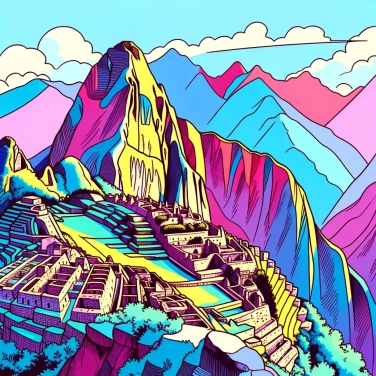The Incas built Machu Picchu so high in the mountains for reasons of security and protection against invasions, as well as to benefit from a strategic defensive position.

By building Machu Picchu at this precise location, perched at about 2400 meters above sea level, the Incas had a stunning view to monitor the surroundings. It was difficult for an enemy to catch them off guard: the steep slopes and narrow paths made access extremely complicated for any surprise attack. The terrain provided the inhabitants with a real natural defensive advantage: it was a true natural fortress, hard to reach and easy to defend. From up there, any intruder coming from afar could be quickly spotted, giving defenders ample time to organize. There was no need to build many walls or imposing ramparts; the elevated position alone was enough to discourage any invasion.
The Incas were remarkably skilled at coping with a hostile environment. They built Machu Picchu on stepped terraces, called andenes, to prevent landslides and manage water in the mountains. They knew exactly how to channel intense rainfall through ingenious drainage and water collection systems. These methods not only prevented erosion but also allowed for high-altitude agriculture, particularly in cultivating corn and potatoes. Basically, they turned a constraint into an opportunity, no worries!
For the Incas, the mountains were sacred, representing powerful deities called Apus. Machu Picchu, perched high up, allowed for a closer connection to the sky and thus to the gods. For the Incas, living on these peaks was a way to directly connect with spiritual powers, seek their protection, and celebrate important religious ceremonies. The precise choice of location was also linked to the stars, as certain peaks or rock formations aligned with the sun or other significant stars at specific times of the year, such as during the solstice. The entire landscape held spiritual significance, a kind of living sacred geography, where each mountain was both protective and a religious symbol.
Building Machu Picchu so high gave them access to extremely valuable resources at altitude. They cultivated on stepped terraces, called andenes, which retained water and limited erosion. This allowed them to produce corn, potatoes, and other essential foods for their survival, even at over 2400 meters above sea level. They also took advantage of natural water sources from the mountains, which they channeled through ingenious irrigation systems. In addition, the mountainous environment provided them with many useful resources such as granite, used to build their impressive structures, and various rare medicinal plants found only at high altitudes.
Thanks to an ingenious agricultural technique called terrace farming, the Incas effectively cultivated corn, potatoes, and quinoa at an altitude of nearly 2,430 meters.
The Incas used the high position of Machu Picchu both to observe the stars and predict the seasons, and to monitor any potential enemies approaching from afar.
Although impressive, Machu Picchu was only known locally until its official rediscovery in 1911 by the American explorer Hiram Bingham.
The site of Machu Picchu features an exceptional drainage and water evacuation system, demonstrating how the Incas perfectly mastered architectural adaptation to the rainy climate of the mountains.
The Incas regarded the mountains as sacred and inhabited by spirits known as 'Apus'. Building Machu Picchu at high altitude helped to strengthen the spiritual connection with these protective deities, as part of their religious beliefs and spiritual rituals.
The mountains provided the Incas with agricultural terraces specially adapted to the altitude, ideal for growing crops such as potatoes, corn, and other cold-resistant crops. The terracing technique allowed for soil fertility management, played an important role in water management, and helped prevent erosion.
Machu Picchu was probably not permanently inhabited by a large population. Researchers believe it was more likely a royal residence or a seasonal ceremonial center hosting the Inca elite along with a handful of administrators and priests.
The high and isolated position of Machu Picchu allowed it to escape destruction by the Spanish conquistadors. Furthermore, its difficult access and hidden location among the mountains contributed to its protection, thus ensuring its exceptional preservation through the centuries.
The Incas possessed advanced knowledge in engineering, allowing them to precisely cut stones and efficiently transport the materials needed to build a complex site at high altitude. They also mastered the management of local resources and had an organized and experienced workforce.

No one has answered this quiz yet, be the first!' :-)
Question 1/5